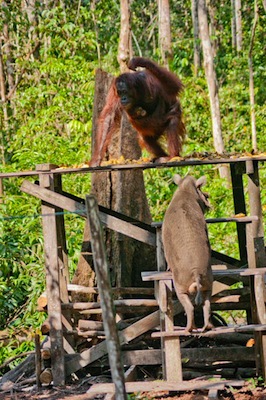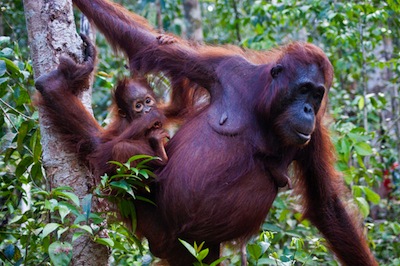By Jonathan Tanner
ITWPA Member
As we get off the boat, we are greeted by local resident Peta and her young daughter, welcoming us to Camp Leakey in Tanjung Puting National Park in Kalimantan (Indonesian Borneo). Peta is short but strong and silent. Her hair gleams red-brown in the dappled sunlight. But we have been warned not to approach her.
Peta is an orang-utan, one of a few thousand survivors of her species now confined to the tropical islands of Sumatra and Borneo. The national park she inhabits is only accessible by boat and requires several hours of upstream travel along the Sekanyer River through jungle flanked by banks of brine-loving nypa palms that give way to freshwater pandanus thickets.
Orang-utan groups are headed by a dominant male who does his best to ensure his genes are passed on to the next generation. We have already come in contact with “king” Yani in his territory some miles downriver. He is big, red, raucous, and barely tolerant of outsiders, throwing branches at us from his vantage point high in the tree canopy and forcing us to retreat — definitely not someone to tangle with. Now we disembark upstream and hope to catch a glimpse of the king who rules these more remote parts.
As we walk through the jungle, our guide warns us to tread quietly to avoid disturbing the wildlife. Soon we reach a clearing furnished with some rough wooden benches facing a platform where park rangers deposit bunches of bananas and containers of milk daily to attract orang-utans that were previously rehabilitated and returned to the jungle.
 The platform is a hive of activity. A large male sits quietly eating from a large bunch of bananas he has hoarded in front of him. A female and her baby grab a few bananas and munch on them, baby reluctantly releasing its hold on mother’s fur. A wild pig, tail wagging and grey skin glistening after a recent mud bath, hovers around the base of the platform, unsure whether to risk a walk up the stairs to grab a few bananas from under mama’s nose. Eventually she attempts a tentative ascent. But mama has audacious Miss Piggy in her sights and gives her a firm rap on the head with clenched fist. Miss Piggy retreats, to be joined later at the platform base by her three piglets — but having learned her lesson, she makes no further attempt at ascending the platform.
The platform is a hive of activity. A large male sits quietly eating from a large bunch of bananas he has hoarded in front of him. A female and her baby grab a few bananas and munch on them, baby reluctantly releasing its hold on mother’s fur. A wild pig, tail wagging and grey skin glistening after a recent mud bath, hovers around the base of the platform, unsure whether to risk a walk up the stairs to grab a few bananas from under mama’s nose. Eventually she attempts a tentative ascent. But mama has audacious Miss Piggy in her sights and gives her a firm rap on the head with clenched fist. Miss Piggy retreats, to be joined later at the platform base by her three piglets — but having learned her lesson, she makes no further attempt at ascending the platform.
All around us orang-utans are feeding, nurturing their young, whooping, swinging through the canopy with remarkable athletic grace, and occasionally brawling. Every few minutes, one of these great apes strides uncomfortably close to its human observers, causing us to scatter in alarm. Then a female with baby decides to climb a spindly tree directly in front of our observation benches. As she reaches the top, a stream of urine gushes down, hitting the ground with a splash and sending some droplets onto the feet of observers sitting on the front bench. As they recoil, dollops of solid excrement plop at their feet, one clod grazing the t-shirt of the startled woman in front of me and settling right next to her on the first bench. We all laugh nervously. I’m suddenly thankful I’m sitting in the second row.
 We don’t get to see the king orang-utan this time. We have nevertheless experienced — and participated in — the natural show of a lifetime in an extraordinary part of the world, and depart feeling exceptionally privileged.
We don’t get to see the king orang-utan this time. We have nevertheless experienced — and participated in — the natural show of a lifetime in an extraordinary part of the world, and depart feeling exceptionally privileged.
If you’d like to purchase this article for your publication, click here to contact the author directly.
Verify an online pharmacy before you buy drugs
